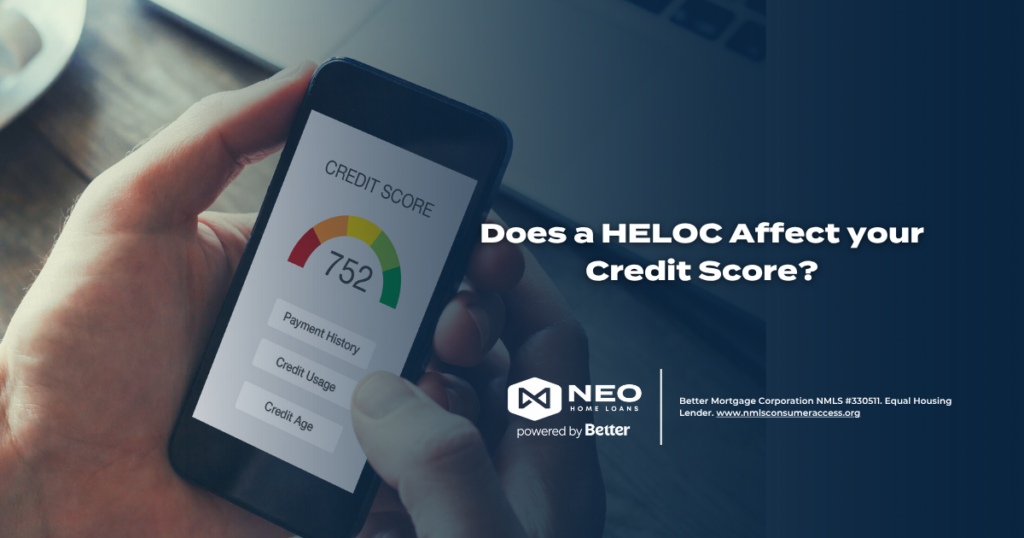
You’ve spent years building equity in your home. Maybe now you’re wondering how to use it to strengthen, not strain, your financial picture.
That’s where a home equity line of credit (HELOC) can come in. It’s one of the most flexible ways to access the value you’ve already earned in your home.
But many homeowners ask the same question before applying:
“Will a HELOC hurt my credit score?”
The short answer: it depends on how you use it. The long answer: it can actually help if you handle it wisely. Let’s break it down.
Understanding What a HELOC Really Is
Think of a HELOC as a financial safety net that you control. It’s not a lump-sum loan. It’s a revolving line of credit that lets you borrow against the equity in your home when you need it.
At NEO Home Loans, we see HELOCs as tools for strategy, not just spending. They can help you:
- Pay off higher-interest debt and lower monthly payments
- Fund renovations that raise your home’s value
- Invest in opportunities like education or a second property
- Build financial flexibility for the unexpected
Used the right way, a HELOC is more than a loan. It’s a bridge between where you are financially and where you want to go next.
How a HELOC Affects Your Credit: The Right Way to Think About It
Your credit score reflects how you manage debt.
A HELOC adds a new credit account to that picture, so naturally it influences your score in a few ways:
- Applying for a HELOC:
When you apply, your lender checks your credit. This “hard inquiry” might cause a small, temporary dip, usually just a few points.
But good news: if you apply with multiple lenders within a short period, it typically counts as one inquiry. - Opening the line:
Adding a HELOC can lower your average account age, but it also increases your available credit, which can help your score by reducing your overall credit utilization. - Making payments:
This is where you have real control. Making consistent, on-time payments strengthens your credit history over time. Missed or late payments do the opposite.
In short: applying might nudge your score slightly, but managing your HELOC responsibly can boost it over the long term.
What Happens When You Close a HELOC
Once your balance is paid off, closing your HELOC can slightly shift your score again.
That’s because your total available credit shrinks when the account closes, raising your utilization ratio if you have other active debts.
However, if you’ve maintained a solid payment history, that record stays on your credit report for up to 10 years, continuing to help your score even after the line is closed.
The key takeaway: closing a HELOC doesn’t erase the progress you’ve made. It just changes how your credit profile is calculated.
The NEO Difference: Use Equity Intentionally
At NEO Home Loans, we believe your home should be part of your wealth strategy, not just your housing expense.
A HELOC is one of many tools we help clients use strategically to:
- Improve cash flow and reduce high-interest debt
- Access funds for investments or upgrades
- Build long-term financial stability and credit strength
Our advisors take time to understand your full picture, your goals, your timeline, and your comfort level, and then show you how to use your home’s equity in a way that protects your financial health.
Because at NEO, we don’t just help you get a loan. We help you build a plan for financial freedom.
Tips for Protecting Your Credit When Using a HELOC
- Make every payment on time. It’s the single biggest factor in maintaining a healthy score.
- Borrow intentionally. Only draw what you need for goals that strengthen your finances.
- Avoid maxing out your credit line. Keeping usage low helps your score.
- Keep older credit accounts open. This balances the impact of opening a new HELOC.
- Work with a mortgage advisor who looks beyond the rate. The right strategy can make all the difference.
Ready to Learn How to Use Your Home’s Equity Wisely?
Your credit score is just one piece of your financial story.
At NEO Home Loans, we’ll help you understand how a HELOC fits into the bigger picture so you can use your equity with confidence, clarity, and purpose.










